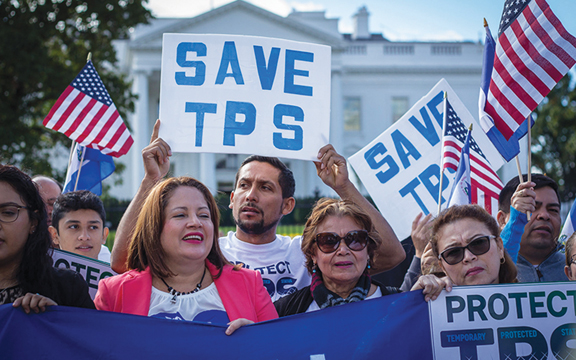By Scott A. Emerick, associate attorney at Law Offices of Ally Bolour, APC
Earlier this year, the 9th Circuit Court of Appeals decided a case that made it possible for people with temporary protected status (TPS) to apply for a green card if they have an approved family visa.
TPS is a status for individuals from certain countries that the Secretary of Homeland Security deems unsafe to return to. Current TPS designated countries include El Salvador, Honduras, and Syria. Some countries, such as El Salvador, have been designated for temporary protected status for many years. While allowing eligible individuals to stay in the U.S. and work legally, it provides no opportunity for permanent status.
The 9th Circuit decided in Ramirez v. Brown that a man who came to the U.S. from El Salvador in 1999 without lawful entry but who had TPS beginning in 2001 was eligible to apply for adjustment of status based on an underlying approved visa from his U.S. citizen spouse.
Mr. Ramirez had married a U.S. citizen in 2012 and applied for an immigrant visa and adjustment of status (commonly referred to as a green card.) The government approved his marriage-based visa but denied his application for a green card because he did not have lawful entry into the U.S. Mr. Ramirez appealed the decision and the appeals court decided that because Mr. Ramirez had TPS, this constituted legal status and a legal admission for the purposes of applying for a green card.
The government initially reserved their right to appeal the decision, leaving some doubt as to whether the case would be heard by the U.S. Supreme Court. However, the government let the deadline for filing an appeal lapse and USCIS is now adjudicating these cases.
This decision makes possible for many immigrants who have been living in the U.S. with TPS to move forward with attaining a permanent status in this country and avoid problems associated with needing to renew their TPS repeatedly.
Of course, there are a number of other factors that determine whether or not a non-U.S. citizen can seek entrance or residency in the United States; such as criminal history, terrorist activities, health, and economic grounds. Any of these reasons, and many more, could prevent the admission or adjustment of status of an immediate relative of a U.S. citizen.
Every case is unique and this article is not intended to be legal advice, and should not be taken as such. If you believe you or someone you know may now be eligible for benefits under immigration law, you should consult an attorney about the specifics of your case.


